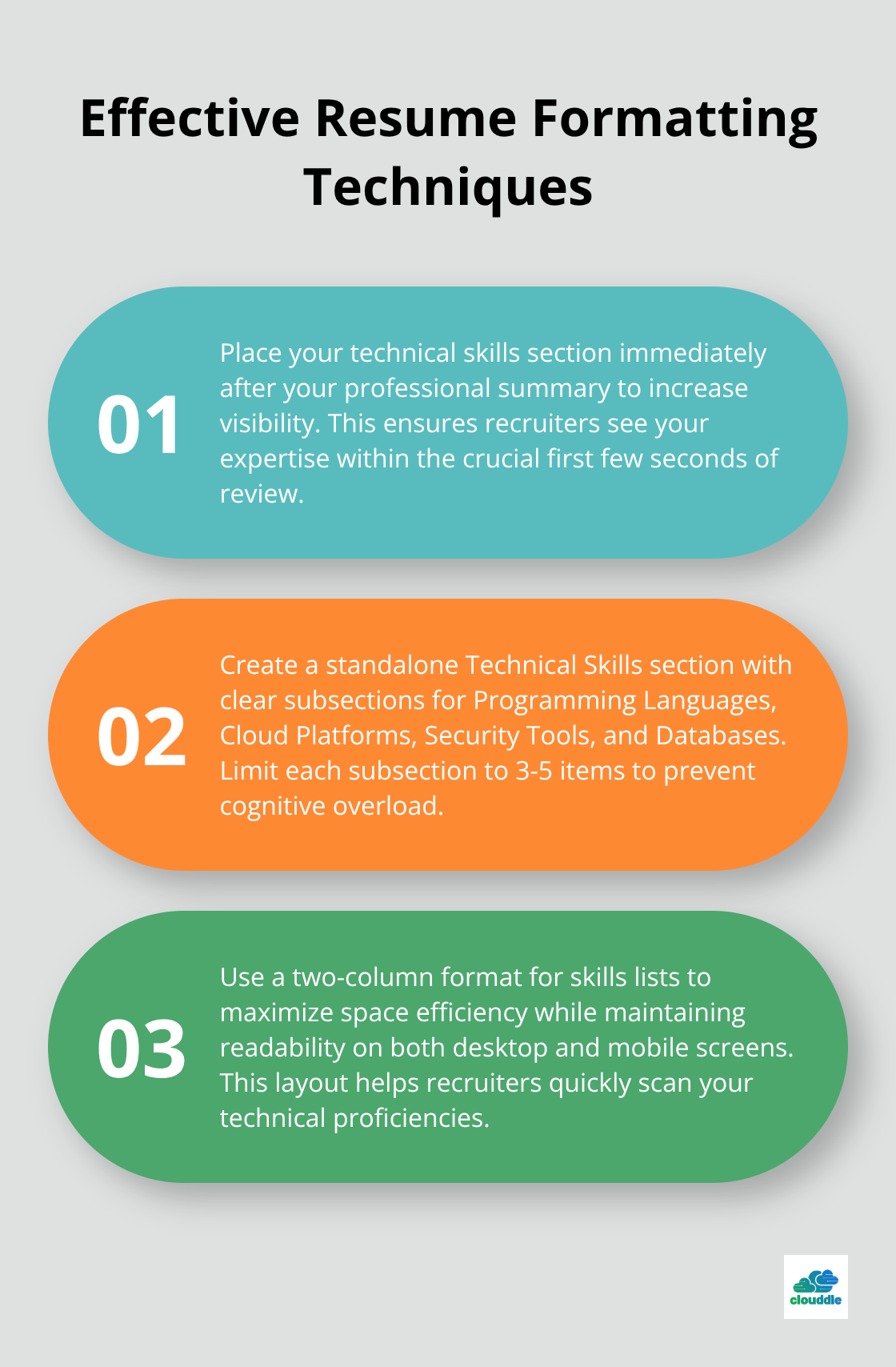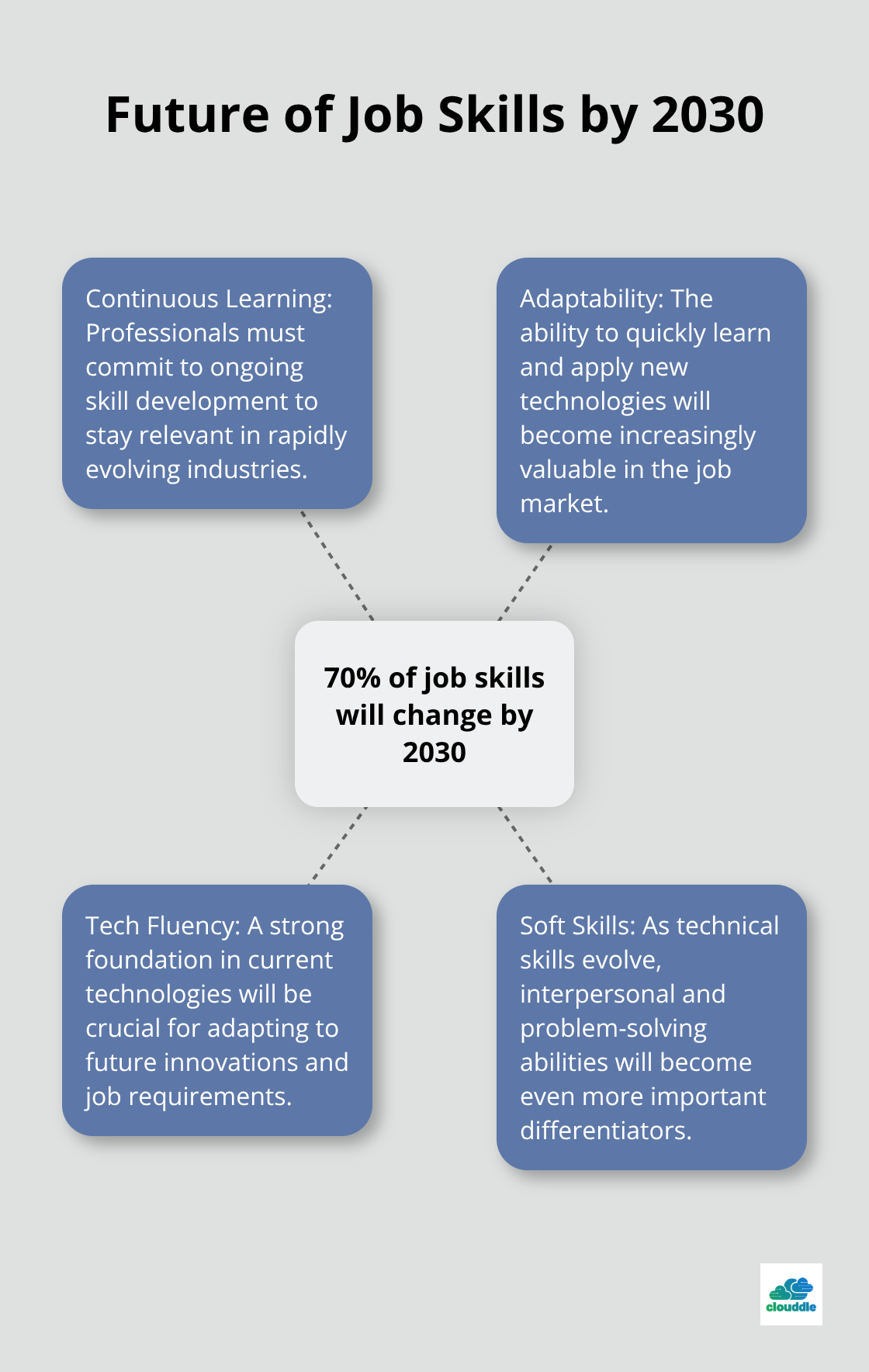Your technical skills can make or break your job application in today’s competitive IT market. Most recruiters spend just six seconds scanning each CV, making your IT packages for CV presentation absolutely critical.
At Clouddle, we’ve seen countless talented professionals miss opportunities simply because they failed to showcase their technical expertise effectively. The right approach transforms your skills section from a basic list into a powerful career accelerator.
Essential IT Skills to Highlight on Your CV
Programming Languages That Drive Hiring Decisions
Programming languages form the backbone of any strong IT CV, but specificity matters more than quantity. JavaScript, Python and SQL are all highly-desired and admired programming languages among developers. Focus on three to five languages where you can demonstrate real proficiency instead of listing every language you’ve touched. Include your years of experience and specific frameworks – React for JavaScript, Django for Python, or .NET for C#. Recruiters at major tech companies like Google and Microsoft specifically search for these combinations when they filter candidates.
Cloud Platforms That Employers Actually Want
Amazon Web Services dominates 32% of the cloud market according to Canalys Q2 2024 data, which makes AWS certifications your highest ROI investment. Solutions Architect Associate certification holders earn an average of $130,000 annually compared to $95,000 for non-certified professionals. Microsoft Azure follows at 23% market share, with Azure Fundamentals as the entry point most hiring managers recognize. Google Cloud Platform (despite its 11% market share) offers the highest salary premiums for certified professionals at major enterprises. Skip generic cloud mentions – specify EC2, S3, Lambda for AWS or Virtual Machines, Storage Accounts, Functions for Azure.

Security Skills That Command Premium Salaries
Cybersecurity professionals earn 25% more than general IT roles, with specific skills that drive the biggest premiums. The cybersecurity job market shows 514,359 online job openings nationally. Penetration testing skills with tools like Metasploit or Burp Suite command salaries that exceed $120,000 annually. Identity and Access Management experience with Active Directory or Okta appears in 78% of enterprise security roles. Zero Trust architecture knowledge has grown 340% in job postings since 2022 (making it the fastest-growing security skill requirement).
The way you present these technical skills matters just as much as the skills themselves, which brings us to the strategic formatting techniques that make your expertise stand out to both ATS systems and human recruiters.
Formatting and Presenting Your IT Skills Effectively
Strategic Placement Drives Visibility
Your skills section placement determines whether recruiters will actually see your expertise. Place your technical skills section immediately after your professional summary, not buried at the bottom where recruiters look at resumes for longer when they feature simple layouts with clear sections and heading titles. Create a standalone Technical Skills section with clear subsections for Programming Languages, Cloud Platforms, Security Tools, and Databases. Each subsection should contain 3-5 items maximum to prevent cognitive overload. Use a two-column format for skills lists to maximize space efficiency while maintain readability on both desktop and mobile screens.

Industry-Standard Terminology Beats Generic Descriptions
Generic skill descriptions kill your chances with Applicant Tracking Systems that scan for exact keyword matches. Write JavaScript ES6+ instead of just JavaScript. Specify AWS Lambda and S3 rather than vague cloud experience. Include certification numbers and expiration dates for credentials like CompTIA Security+ CE or Microsoft Azure Solutions Architect Expert. Resume keywords are the specific words and phrases employers use to search for qualified candidates in their applicant tracking systems. Replace outdated terminology immediately – say DevOps instead of system administration, and Kubernetes instead of container orchestration.
Quantified Achievements Transform Basic Lists
Numbers transform basic skill listings into compelling evidence of your capabilities. Instead of listing Python, write Python with 4+ years developing REST APIs serving 50,000+ daily users. Replace generic database experience with PostgreSQL optimization that reduced query response times by 40% across 15 production servers. Include specific metrics like 99.9% uptime maintenance, 500GB+ data migrations, or security implementations protecting 10,000+ user accounts. These quantified achievements separate senior-level candidates from junior applicants and directly address the results-focused questions that technical hiring managers ask during interviews.
Professional Certification Display Standards
Certifications require strategic presentation to maximize their impact on your application. List active certifications with full official names, certification bodies, and current status (rather than expired credentials that signal outdated knowledge). Group certifications by category – Security, Cloud, Project Management – to help recruiters quickly identify relevant qualifications. Include pursuit dates for certifications you’re currently earning, as this demonstrates commitment to continuous learning that hiring managers value highly.
Even perfectly formatted technical skills won’t save your application if you make critical presentation mistakes that immediately disqualify candidates from consideration.
Common Mistakes to Avoid When Listing IT Skills
Proficiency Level Inflation Backfires During Interviews
Rating yourself as expert in technologies you barely know creates immediate credibility problems during technical interviews. Stack Overflow’s 2024 developer survey shows that 73% of hiring managers conduct live coding assessments, which instantly expose inflated skill claims. Use honest proficiency levels: beginner (0-1 years), intermediate (2-4 years), or advanced (5+ years) with specific project examples. Companies like Amazon and Meta use behavioral interviews that dig deep into your actual experience with each technology you list. When you claim React expertise but cannot explain component lifecycle methods, your entire application loses credibility with the interview team.
Legacy Technology Listings Signal Outdated Knowledge
Obsolete technologies like Flash, Internet Explorer compatibility, or jQuery dominance tell recruiters you haven’t kept pace with industry evolution. According to LinkedIn research, 70% of skills used in most jobs will change by 2030. Remove any technology that hasn’t received major updates in the past three years unless the specific role explicitly requires legacy system maintenance. Modern employers want professionals who understand current development practices, not candidates stuck in outdated methodologies that slow down development teams.

Generic Skills Lists Miss Job-Specific Requirements
Identical skill sections sent to every employer ignore the specific technology stacks that companies actually use in production. Research shows that tailored applications receive 40% more interview callbacks than generic submissions. Study each job posting carefully and mirror their exact technology terminology – if they mention React with TypeScript, don’t just list React and JavaScript separately. Companies use Applicant Tracking Systems programmed to match specific keyword combinations and generic skill lists fail these automated screening processes that determine whether human recruiters ever see your application.
Skill Organization Chaos Confuses Recruiters
Random skill arrangements force recruiters to hunt for relevant expertise instead of quickly identifying your qualifications. Group related technologies together under clear categories like Frontend Development, Backend Systems, or Database Management. List skills within each category by proficiency level or years of experience rather than alphabetical order. Technical hiring managers scan for specific skill combinations, and poor organization makes this process unnecessarily difficult for the people who decide your interview fate. When highlighting network performance or security solutions expertise, ensure these specialized skills appear prominently within their respective categories.
Final Thoughts
Your IT packages for CV success depend on three fundamental strategies that separate standout candidates from the competition. Focus on current, high-demand technologies with specific proficiency levels backed by quantifiable achievements. Organize your technical skills strategically with industry-standard terminology that passes both ATS screening and human review. Tailor every application to match the exact technology stack mentioned in job postings rather than sending generic skill lists.
Well-presented technical expertise directly impacts your earning potential and career trajectory. Certified cloud professionals earn 25% more than their non-certified peers, while properly formatted skill sections increase interview callbacks by 40%. The difference between landing your target role and getting filtered out often comes down to how effectively you communicate your technical capabilities.
Continuous skill development requires you to stay current with emerging technologies and regularly update your CV to reflect new competencies. Focus on learning technologies that align with industry growth trends (particularly in cloud computing, cybersecurity, and automation). At Clouddle, we help businesses maintain cutting-edge expertise in networking and managed IT solutions that support modern technology infrastructure requirements.


